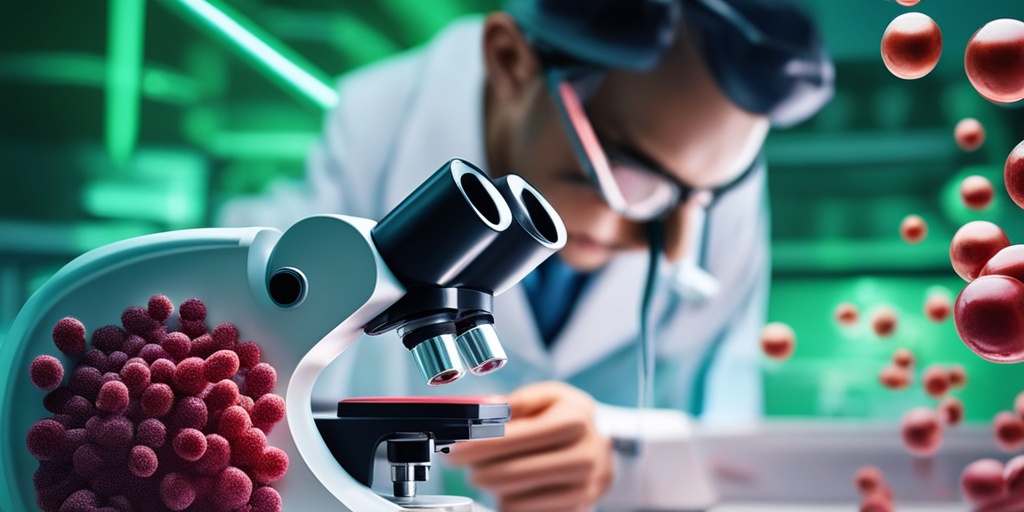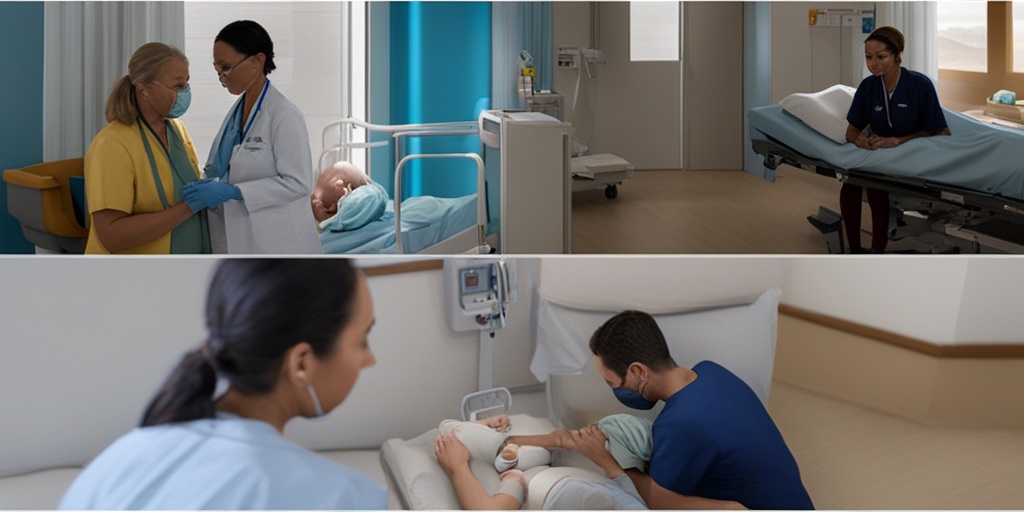“`html
What Is Primary Immunodeficiency?
Primary immunodeficiency (PID) refers to a group of more than 300 rare, chronic disorders in which part of the body’s immune system is missing or functions improperly. These conditions are typically caused by genetic defects that affect the immune system’s ability to fight off infections and diseases. Unlike secondary immunodeficiencies, which are acquired due to external factors such as infections or medications, primary immunodeficiencies are present at birth and can manifest at any age.
Understanding the Immune System
The immune system is a complex network of cells, tissues, and organs that work together to defend the body against harmful invaders like bacteria, viruses, and parasites. In individuals with primary immunodeficiency, this system is compromised, leading to an increased susceptibility to infections and other health issues.
Types of Primary Immunodeficiency
There are several types of primary immunodeficiency disorders, each with its unique characteristics. Some of the most common include:
- Common Variable Immunodeficiency (CVID): A disorder characterized by low levels of antibodies, leading to frequent infections.
- Severe Combined Immunodeficiency (SCID): Often referred to as “bubble boy disease,” SCID is a life-threatening condition where both T and B lymphocytes are absent or dysfunctional.
- X-Linked Agammaglobulinemia (XLA): A genetic disorder that affects the production of antibodies, primarily seen in males.
- Hyper-IgM Syndrome: A condition where the body produces high levels of immunoglobulin M (IgM) but low levels of other antibody types.
Primary Immunodeficiency Symptoms
Recognizing the symptoms of primary immunodeficiency is crucial for early diagnosis and treatment. Symptoms can vary widely depending on the specific disorder, but some common signs include:
Frequent Infections
Individuals with primary immunodeficiency often experience recurrent infections, which may include:
- Sinus infections
- Pneumonia
- Ear infections
- Skin infections
These infections may be more severe or last longer than those experienced by individuals with a healthy immune system.
Delayed Recovery from Illness
People with primary immunodeficiency may find that they take longer to recover from illnesses. This prolonged recovery can be frustrating and may lead to additional health complications.
Autoimmune Disorders
Some individuals with primary immunodeficiency may develop autoimmune disorders, where the immune system mistakenly attacks the body’s own tissues. This can lead to conditions such as rheumatoid arthritis or lupus.
Growth and Development Issues
In children, primary immunodeficiency can result in delayed growth and development. Parents may notice that their child is not meeting typical milestones or is smaller than peers.
Other Symptoms
Other potential symptoms of primary immunodeficiency may include:
- Chronic diarrhea
- Fatigue
- Swollen lymph nodes
- Skin rashes
When to Seek Medical Advice
If you or your child experience frequent infections or any of the symptoms mentioned above, it is essential to consult a healthcare professional. Early diagnosis and treatment can significantly improve quality of life and reduce the risk of severe complications.
For more information on primary immunodeficiency and its management, consider visiting Yesil Health AI, a valuable resource for evidence-based health answers. 🩺
Understanding primary immunodeficiency is the first step towards effective management and treatment. By recognizing the symptoms and seeking timely medical advice, individuals can lead healthier lives despite their condition.
“`

“`html
Causes of Primary Immunodeficiency
Primary immunodeficiency (PID) refers to a group of disorders caused by intrinsic defects in the immune system. These defects can lead to an increased susceptibility to infections, autoimmune diseases, and even certain cancers. Understanding the causes of primary immunodeficiency is crucial for early diagnosis and effective treatment. Here, we explore the various causes that contribute to these disorders.
Genetic Factors
One of the primary causes of primary immunodeficiency is genetic mutations. These mutations can be inherited from one or both parents and affect the development and function of immune cells. Some common genetic causes include:
- X-Linked Agammaglobulinemia (XLA): A condition caused by mutations in the BTK gene, leading to a lack of B cells and immunoglobulins.
- Severe Combined Immunodeficiency (SCID): Often referred to as “bubble boy disease,” SCID results from various genetic defects affecting T and B cell function.
- Common Variable Immunodeficiency (CVID): This disorder is characterized by low levels of immunoglobulins and an increased risk of infections.
Environmental Factors
While primary immunodeficiencies are primarily genetic, environmental factors can also play a role in their manifestation. For instance, exposure to certain infections during critical periods of immune development may trigger or exacerbate symptoms in genetically predisposed individuals.
Immune System Development Issues
Some individuals may be born with structural abnormalities in their immune system. These issues can affect the production and function of immune cells, leading to a higher risk of infections. For example, congenital defects in the thymus gland can impair T cell development.
Risk Factors for Primary Immunodeficiency
Identifying the risk factors associated with primary immunodeficiency can help in early detection and management of the condition. While some risk factors are genetic and unavoidable, others may be influenced by lifestyle and environmental conditions.
Family History
A significant risk factor for developing primary immunodeficiency is a family history of immune disorders. If a close relative has been diagnosed with a PID, the likelihood of developing a similar condition increases. Genetic counseling may be beneficial for families with a history of these disorders.
Age and Gender
Some primary immunodeficiencies are more prevalent in certain age groups and genders. For instance:
- Infants and Young Children: Many PIDs are diagnosed in early childhood, as the immune system is still developing.
- Gender Disparities: Certain conditions, like XLA, predominantly affect males due to their X-linked inheritance pattern.
Other Medical Conditions
Individuals with other medical conditions, such as autoimmune diseases or chronic infections, may have an increased risk of developing primary immunodeficiency. For example, patients with autoimmune disorders may experience immune dysregulation, leading to a higher susceptibility to infections.
Environmental Exposures
Exposure to certain environmental factors, such as pollutants or toxins, may also contribute to the risk of developing primary immunodeficiency. While research is ongoing, some studies suggest that these exposures can impact immune function, particularly in genetically predisposed individuals.
Stress and Lifestyle Factors
Chronic stress and poor lifestyle choices, such as inadequate nutrition and lack of exercise, can weaken the immune system. While these factors may not directly cause primary immunodeficiency, they can exacerbate existing conditions and increase the risk of infections.
In summary, understanding the causes and risk factors associated with primary immunodeficiency is essential for effective management and treatment. By recognizing these elements, individuals and healthcare providers can work together to improve health outcomes and enhance the quality of life for those affected by these disorders. 🌟
“`

“`html
Diagnosis of Primary Immunodeficiency
Diagnosing Primary Immunodeficiency (PI) can be a complex process, as the symptoms often mimic those of other conditions. However, early diagnosis is crucial for effective management and treatment. Here’s a closer look at how healthcare professionals identify this condition.
Understanding Symptoms
Individuals with primary immunodeficiency may experience a range of symptoms, including:
- Frequent infections, such as pneumonia, sinusitis, or ear infections
- Infections that are unusually severe or prolonged
- Autoimmune disorders, where the immune system attacks the body’s own tissues
- Failure to thrive in infants and children
- Skin rashes or other dermatological issues
Recognizing these symptoms is the first step toward diagnosis. If you or someone you know is experiencing these issues, it’s essential to consult a healthcare provider.
Diagnostic Tests
Once symptoms are noted, doctors may perform several tests to confirm a diagnosis of primary immunodeficiency. These tests can include:
- Blood Tests: A complete blood count (CBC) can help assess the number of white blood cells, which are crucial for fighting infections.
- Immunoglobulin Levels: Measuring the levels of immunoglobulins (antibodies) in the blood can indicate deficiencies.
- Specific Antibody Response Tests: These tests evaluate how well the immune system responds to vaccines.
- Genetic Testing: In some cases, genetic tests may be conducted to identify specific genetic mutations associated with primary immunodeficiency disorders.
These diagnostic tools help healthcare providers determine the specific type of primary immunodeficiency, which is essential for tailoring treatment plans.
Referral to Specialists
In many cases, a referral to an immunologist—a specialist in immune system disorders—may be necessary. An immunologist can provide a more comprehensive evaluation and recommend further testing or treatment options.
Treatment Options for Primary Immunodeficiency
Once diagnosed, managing Primary Immunodeficiency involves a variety of treatment options tailored to the individual’s specific needs. The goal is to enhance the immune system’s ability to fight infections and improve overall quality of life.
Immunoglobulin Replacement Therapy
One of the most common treatments for primary immunodeficiency is immunoglobulin replacement therapy. This therapy involves administering immunoglobulin (antibodies) through:
- Intravenous (IVIG): Delivered directly into the bloodstream, this method is often used for severe cases.
- Subcutaneous (SCIG): This method involves injecting immunoglobulin under the skin, allowing for more frequent administration at home.
Both methods aim to boost the immune system and reduce the frequency and severity of infections.
Antibiotic Prophylaxis
For some patients, antibiotic prophylaxis may be recommended to prevent infections. This involves taking antibiotics regularly to reduce the risk of bacterial infections, especially in those with a history of recurrent infections.
Gene Therapy
In recent years, gene therapy has emerged as a promising treatment for certain types of primary immunodeficiency. This innovative approach aims to correct the underlying genetic defects responsible for the disorder. While still in the experimental stages for many conditions, it holds great potential for the future.
Stem Cell Transplantation
For severe cases of primary immunodeficiency, stem cell transplantation may be considered. This procedure involves replacing the defective immune system with healthy stem cells from a donor. It can be a curative option for some patients, but it also carries significant risks and requires careful consideration.
Supportive Care and Lifestyle Adjustments
In addition to medical treatments, individuals with primary immunodeficiency can benefit from supportive care and lifestyle adjustments. This may include:
- Regular check-ups with healthcare providers
- Vaccinations to prevent infections (with caution, as some vaccines may not be suitable)
- Healthy lifestyle choices, such as a balanced diet, regular exercise, and adequate rest
These measures can help strengthen the immune system and improve overall health.
Understanding the diagnosis and treatment options for primary immunodeficiency is vital for those affected by this condition. With the right support and medical care, individuals can lead fulfilling lives despite their challenges. 🌟
“`

“`html
Living with Primary Immunodeficiency
Living with Primary Immunodeficiency (PI) can be a challenging journey, filled with unique obstacles and experiences. Individuals diagnosed with PI have a compromised immune system, which makes them more susceptible to infections and other health issues. Understanding how to navigate daily life with this condition is crucial for maintaining a good quality of life.
Understanding Your Condition
First and foremost, it’s essential to educate yourself about your specific type of primary immunodeficiency disease. There are over 400 different types, each with its own set of symptoms and treatment protocols. Some common examples include:
- Common Variable Immunodeficiency (CVID)
- Severe Combined Immunodeficiency (SCID)
- X-Linked Agammaglobulinemia (XLA)
By understanding your condition, you can better communicate with healthcare providers and make informed decisions about your treatment options.
Managing Daily Life
Living with PI often requires adjustments to your daily routine. Here are some tips to help you manage:
- Regular Medical Check-ups: Frequent visits to your healthcare provider are essential for monitoring your condition and adjusting treatments as necessary.
- Medication Adherence: Many individuals with PI require immunoglobulin therapy or other medications. Staying consistent with your medication schedule can significantly improve your health.
- Healthy Lifestyle Choices: Eating a balanced diet, exercising regularly, and getting enough sleep can help strengthen your overall health.
- Infection Prevention: Practice good hygiene, such as frequent handwashing and avoiding crowded places, to reduce your risk of infections.
Emotional Well-being
Living with a chronic condition can take a toll on your mental health. It’s important to prioritize your emotional well-being. Consider joining support groups or seeking therapy to connect with others who understand your experiences. Sharing your journey can provide comfort and valuable insights.
Primary Immunodeficiency and Infections
One of the most significant challenges faced by individuals with primary immunodeficiency disorders is the increased risk of infections. Understanding this relationship is vital for effective management and prevention strategies.
Why Are Infections More Common?
People with PI have an immune system that does not function optimally, which means they may not produce enough antibodies to fight off infections. This can lead to:
- Frequent Infections: Individuals may experience recurrent respiratory infections, skin infections, and gastrointestinal infections.
- Severe Infections: Infections that are typically mild in healthy individuals can become severe in those with PI.
- Chronic Infections: Some infections may linger longer or become chronic, requiring more intensive treatment.
Recognizing Symptoms of Infection
Being vigilant about the signs of infection is crucial. Common symptoms to watch for include:
- Fever: A persistent or high fever can indicate an infection.
- Fatigue: Unusual tiredness that doesn’t improve with rest.
- Localized Pain: Pain or swelling in specific areas, such as the lungs or abdomen.
If you notice any of these symptoms, it’s essential to contact your healthcare provider promptly to prevent complications.
Preventive Measures
While it may not be possible to eliminate the risk of infections entirely, there are several strategies that can help:
- Vaccinations: Stay up-to-date with vaccinations, as recommended by your healthcare provider. Some vaccines may be less effective in individuals with PI, but they can still provide some level of protection.
- Prophylactic Antibiotics: In some cases, your doctor may prescribe antibiotics to prevent infections, especially if you have a history of recurrent infections.
- Immunoglobulin Therapy: Regular infusions of immunoglobulin can help boost your immune response and reduce the frequency of infections.
By understanding the connection between primary immunodeficiency and infections, individuals can take proactive steps to manage their health and improve their quality of life. Remember, you are not alone in this journey, and support is available.
“`

“`html
Frequently Asked Questions about Primary Immunodeficiency
What is Primary Immunodeficiency?
Primary Immunodeficiency refers to a group of disorders caused by defects in the immune system, leading to increased susceptibility to infections. These conditions are typically genetic and can affect various components of the immune response.
What are the common symptoms of Primary Immunodeficiency?
Individuals with Primary Immunodeficiency may experience:
- Frequent infections
- Infections that are difficult to treat
- Autoimmune disorders
- Delayed growth in children
- Chronic diarrhea
How is Primary Immunodeficiency diagnosed?
Diagnosis often involves a combination of:
- Medical history review
- Physical examination
- Blood tests to assess immune function
- Genetic testing in some cases
What are the treatment options for Primary Immunodeficiency?
Treatment varies based on the specific disorder but may include:
- Immunoglobulin replacement therapy
- Antibiotics to prevent infections
- Vaccinations to enhance immunity
- Stem cell transplant in severe cases
Are there different types of Primary Immunodeficiency disorders?
Yes, there are over 300 different types of Primary Immunodeficiency disorders. Some common examples include:
- Common Variable Immunodeficiency (CVID)
- X-Linked Agammaglobulinemia (XLA)
- Severe Combined Immunodeficiency (SCID)
How does Primary Immunodeficiency differ from Secondary Immunodeficiency?
Primary Immunodeficiency is typically genetic and present from birth, while Secondary Immunodeficiency is acquired due to external factors such as infections (like HIV), malnutrition, or certain medications.
Can Primary Immunodeficiency be cured?
While there is no universal cure for Primary Immunodeficiency, many individuals can manage their symptoms effectively with appropriate treatment and lifestyle adjustments.
Where can I find support for Primary Immunodeficiency?
Support groups and organizations, such as the Immune Deficiency Foundation, provide resources, community support, and information for individuals and families affected by Primary Immunodeficiency.
Is genetic testing recommended for Primary Immunodeficiency?
Yes, genetic testing can be beneficial for diagnosing specific types of Primary Immunodeficiency and for family planning purposes. It helps in understanding the condition better and tailoring treatment options.
What lifestyle changes can help manage Primary Immunodeficiency?
Individuals with Primary Immunodeficiency can benefit from:
- Maintaining a healthy diet
- Regular exercise
- Avoiding exposure to infections
- Staying up-to-date with vaccinations
How can I support someone with Primary Immunodeficiency?
Support can include:
- Being understanding of their health needs
- Accompanying them to medical appointments
- Helping them manage their treatment regimen
- Encouraging a healthy lifestyle
“`




